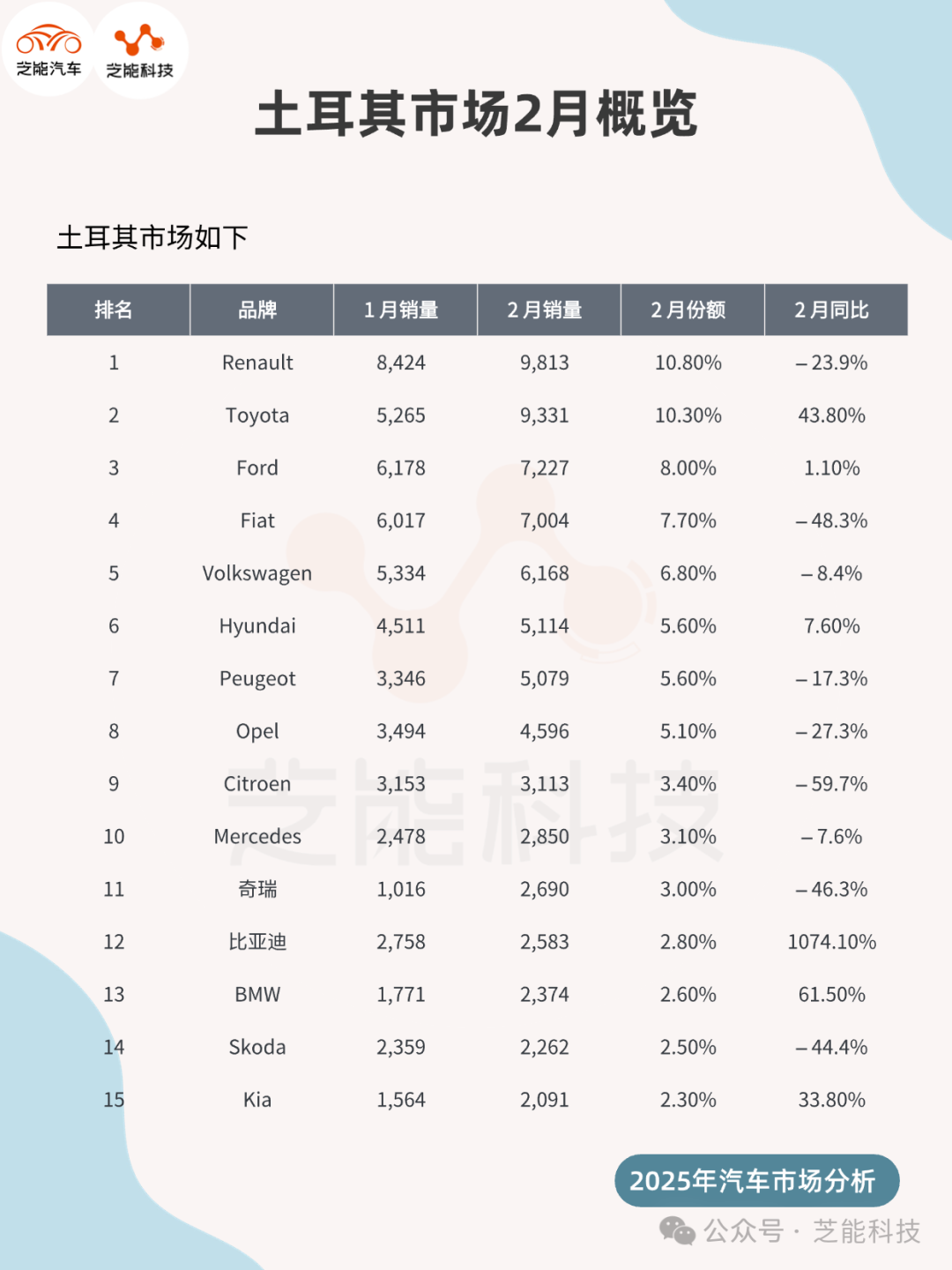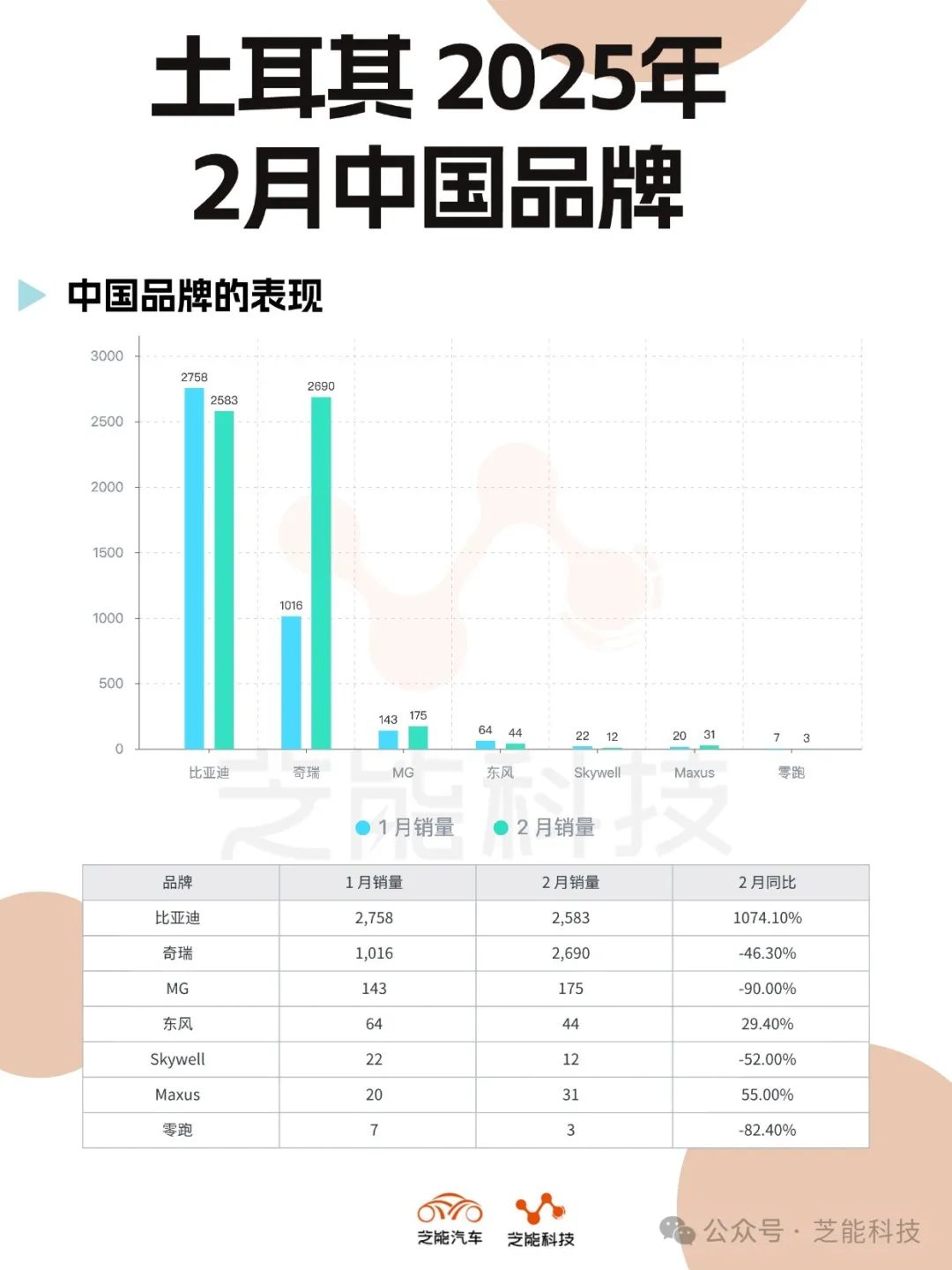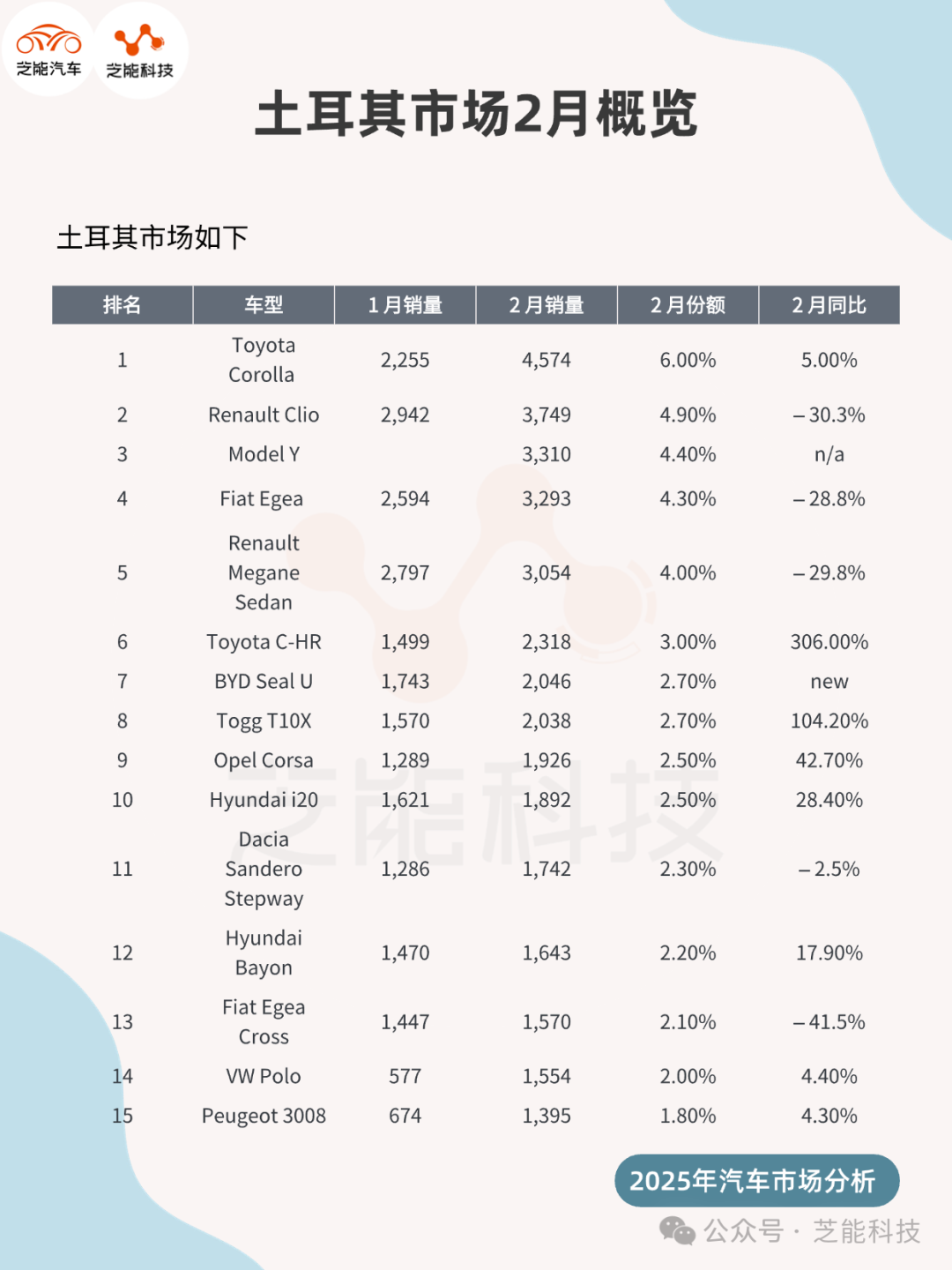Asian Auto Market | Turkey, February 2025: Tesla and BYD Shine Brightly
![]() 03/27 2025
03/27 2025
![]() 587
587

In February 2025, Turkey's new car sales declined 14.4% year-on-year to 90,730 units, with year-to-date sales reaching 159,384 units, both figures marking the second-highest levels on record.
The market is experiencing pressure overall, with Renault retaining the lead at 10.8% market share. Toyota surged to second place with a 43.8% increase, while Tesla and BYD debuted in the top 10 with 3,310 and 2,583 units, respectively, fueled by robust demand for electric vehicles. Traditional brands such as Fiat and Volkswagen struggled, while Chinese brands showed mixed performances.
This article delves into Turkish market trends from two angles: sales overview and model performance, shedding light on the latest dynamics in electrification and brand competition.
01
Turkey February 2025 Sales Overview
In February 2025, Turkey's new car market sold 90,730 units, a 14.4% year-on-year drop, with year-to-date sales totaling 159,384 units. Despite the high base from the previous year, performance remained robust, second only to the all-time high.
The sales of the Tesla Model Y (3,310 units) and the local electric vehicle Togg T10X (2,038 units) underscore the accelerating market penetration of battery electric vehicles (BEVs).
Traditional fuel vehicles still dominate, with Renault, Toyota, and Fiat's core models being sedans. Hybrid vehicles, exemplified by the Toyota C-HR, are gaining traction, and the trend towards electrification has become a significant market focus.

●Brand Sales
◎Renault led with 9,813 units (10.8% share) but witnessed a 23.9% year-on-year decline, indicating a solid market base yet weak growth momentum.
◎Toyota soared to second place with 9,331 units (10.3%) and a 43.8% year-on-year increase, achieving its highest-ever ranking.
◎Ford (7,227 units, 8%), Fiat (7,004 units, 7.7%), and Volkswagen (6,168 units, 6.8%) ranked third to fifth. Fiat and Volkswagen fell 48.3% and 8.4%, respectively, performing below the market average.
◎Hyundai (5,114 units, 5.6%) and Peugeot (5,079 units, 5.6%) recorded a 7.6% increase and a 17.3% decrease, respectively. Opel (4,596 units, 5.1%), Citroen (3,113 units, 3.4%), and Mercedes-Benz (2,850 units, 3.1%) occupied the middle ranks.
◎Tesla debuted in the top 10 with 3,310 units (3.6%), ranking ninth.
◎BYD ranked tenth with 2,583 units (2.8%), marking a year-on-year surge of 1074.1%.
●Chinese brands exhibited mixed performances in the Turkish market, with total sales of approximately 5,540 units, accounting for about 6.1% of the market share.
◎BYD led with 2,583 units (2.8%), a year-on-year increase of 1074.1%, showcasing the success of its electric vehicle strategy.
◎Chery ranked second with 2,690 units (3%), despite a 46.3% year-on-year decline, maintaining competitiveness.
◎MG (175 units, 0.2%) fell by 90%, while Dongfeng (44 units), Skywell (12 units), Maxus (31 units), and Leapmotor (3 units) struggled with weak sales, reflecting inadequate brand recognition and channel layout.
Overall, Chinese brands are leveraging electric vehicles to enter the market but still lag in scale and stability.

02
Model Sales and Competitive Landscape
●Model Sales
◎The Toyota Corolla sedan topped the sales chart with 4,574 units (6% share), a 5% year-on-year increase, demonstrating its enduring appeal in the fuel vehicle market.
◎Renault Clio (3,749 units, 4.9%) fell 30.3% to second place, while Tesla Model Y (3,310 units, 4.4%) surged to third, underscoring the electric vehicle boom.
◎Fiat Egea sedan (3,293 units, 4.3%) and Renault Megane sedan (3,054 units, 4%) ranked fourth and fifth, respectively, with declines of 28.8% and 29.8%.
◎Toyota C-HR (2,318 units, 3%) soared 306% to sixth place, while BYD Seal U (2,046 units, 2.7%) debuted impressively in seventh place.
◎The local electric vehicle Togg T10X (2,038 units, 2.7%) increased by 104.2% to eighth place.
◎Opel Corsa (1,926 units, 2.5%) and Hyundai i20 (1,892 units, 2.5%) grew by 42.7% and 28.4%, respectively, ranking ninth and tenth.

●From a competitive standpoint, the Turkish market exhibits a blend of traditional and new energy vehicles.
◎Toyota successfully challenged Renault's long-standing dominance with the strong performance of the Corolla and C-HR, leveraging its dual-track strategy of hybrid and fuel vehicles.
◎The explosive growth of Tesla Model Y and the consistent performance of BYD Seal U indicate that electric vehicles are becoming market favorites, with Turkish consumers increasingly embracing new energy solutions.
◎The sales decline of traditional brands like Fiat and Volkswagen reflects their lag in the transition to electrification.
◎Togg T10X, as a highlight of local brands, underscores the potential of localization strategies.
◎Among Chinese brands, BYD and Chery capitalize on electric vehicles to capture market share, while brands like MG are contracting. Policy support and consumer preferences will continue to drive electric vehicle adoption, and traditional brands must accelerate their transformation to navigate the impact of emerging players.
Summary
Despite Turkey's automotive market declining 14.4% year-on-year in February, the electric vehicle surge and the intensity of brand competition cannot be overlooked.
While Renault maintains its lead, the rise of Toyota, Tesla, and BYD has reshaped the market landscape, and Chinese brands have demonstrated potential in the electrification wave. The success of the local brand Togg and the decline of traditional brands signal Turkey's shift towards new energy.







